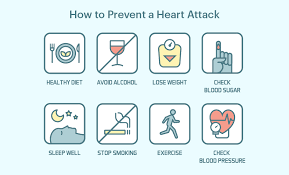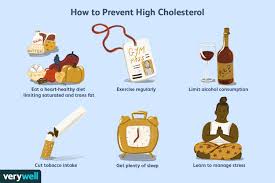
Tips to Prevent a Heart Attack

Eat healthily
Add plenty of fruits and veggies, grains, and foods high in omega-3 fatty acids like fresh tuna or herring to your diet. Cut down on salt, saturated fats, sweets, and red meats. Avoid trans fats and food with "hydrogenated" or "partially hydrogenated" ingredients. Variety in your diet is a good way to get all the nutrients you need.
Exercise regularly
Hit the treadmill or the trail. Walk around the neighborhood or go for a swim. Whatever activity best fits your needs, do it! Regular exercise can prevent heart disease, lower blood pressure, and improve your cholesterol levels.
Avoid stress
Find a relaxation method that works for you. Yoga, meditation, dedicated time to unwind after work these can help keep your stress levels down. Stressful emotions such as anger and hostility may also lead to heart attack risk, so keep calm and be cool.
Quit smoking
If you never started smoking, that's perfect. If you still smoke, stop. Talk to your doctor to find out what method will work best for you. Even people who smoke fewer than five cigarettes a day can have early signs of heart disease.
Mind your blood sugar
Too much sugar in your blood can damage your arteries, even if you don't have diabetes. Work with your doctor to control your levels. That may lower your chance of having a heart attack or stroke. Remember, you can't tell if you have diabetes (or high blood pressure, or high cholesterol) based on how you feel.
LDL cholesterol is harmful
When blood flows through your heart, it can drop traces of cholesterol, fat, and calcium, creating a buildup of plaque in your arteries Too much of that plaque makes a heart attack more likely. If you don't know your cholesterol levels, ask your doctor for a blood test.
Get regular medical checkups
Some of the major risk factors for heart attack - high blood cholesterol, high blood pressure and diabetes cause no symptoms early on. Your doctor can perform tests to check for these conditions and help you manage them, if necessary.
Maintain a healthy blood pressure
If it's too high, your risk of a heart attack and heart disease goes up. Stress management, a healthy low sodium diet, and regular exercise can help you manage your blood pressure. Your doctor may also prescribe medications to lower your levels.
Maintain healthy weight
If you have extra pounds, it can put your heart at risk. Exercise and a good diet help. Ask your doctor or a dietitian what your weight should be and how to get there.
Drink alcohol in moderation only
If you drink alcohol, do so in moderation. For healthy adults, that means up to one drink a day for women and men older than age 65, and up to two drinks a day for men age 65 and younger. Red wine is considered a healthy option.
Be social and friendly
Stay in touch with your friends and family. Research shows that people with more social support are less prone to heart trouble. As you grow your network and make new friends, know that you might be good for their heart health, too.
Get enough sleep
If you don't get enough sleep, you raise your risk of high blood pressure, obesity, and diabetes. Those three things can raise your risk for heart disease. Most adults need 7 to 9 hours of sleep per night. Make sure that you have good sleep habits. If you have frequent sleep problems, contact your doctor.
Have fun in the sun
Sun rays have vitamin D. We know that Vitamin D helps in calcium absorption which keeps the bones sturdy and strong. But many researches show that Vitamin D also prevents heart diseases.


